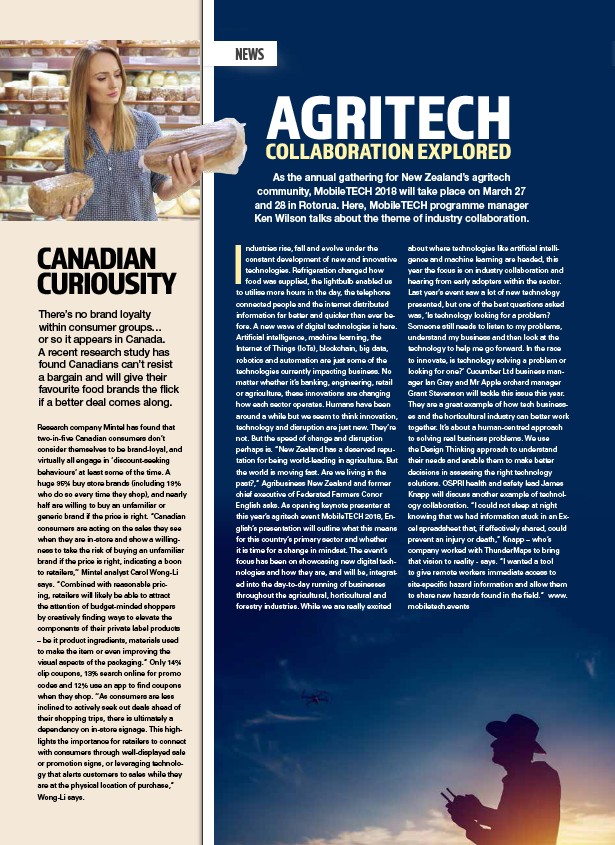
CANADIAN
CURIOUSITY
There’s no brand loyalty
within consumer groups…
or so it appears in Canada.
A recent research study has
found Canadians can’t resist
a bargain and will give their
favourite food brands the flick
if a better deal comes along.
42 MARCH 2018
AGRITECH
COLLABORATION EXPLORED
As the annual gathering for New Zealand’s agritech
community, MobileTECH 2018 will take place on March 27
and 28 in Rotorua. Here, MobileTECH programme manager
Ken Wilson talks about the theme of industry collaboration.
Industries rise, fall and evolve under the
constant development of new and innovative
technologies. Refrigeration changed how
food was supplied, the lightbulb enabled us
to utilise more hours in the day, the telephone
connected people and the internet distributed
information far better and quicker than ever before.
A new wave of digital technologies is here.
Artificial intelligence, machine learning, the
Internet of Things (IoTs), blockchain, big data,
robotics and automation are just some of the
technologies currently impacting business. No
matter whether it’s banking, engineering, retail
or agriculture, these innovations are changing
how each sector operates. Humans have been
around a while but we seem to think innovation,
technology and disruption are just new. They’re
not. But the speed of change and disruption
perhaps is. “New Zealand has a deserved reputation
for being world-leading in agriculture. But
the world is moving fast. Are we living in the
past?,” Agribusiness New Zealand and former
chief executive of Federated Farmers Conor
English asks. As opening keynote presenter at
this year’s agritech event MobileTECH 2018, English’s
presentation will outline what this means
for this country’s primary sector and whether
it is time for a change in mindset. The event’s
focus has been on showcasing new digital technologies
and how they are, and will be, integrated
into the day-to-day running of businesses
throughout the agricultural, horticultural and
forestry industries. While we are really excited
about where technologies like artificial intelligence
and machine learning are headed, this
year the focus is on industry collaboration and
hearing from early adopters within the sector.
Last year’s event saw a lot of new technology
presented, but one of the best questions asked
was, ‘Is technology looking for a problem?
Someone still needs to listen to my problems,
understand my business and then look at the
technology to help me go forward. In the race
to innovate, is technology solving a problem or
looking for one?’ Cucumber Ltd business manager
Ian Gray and Mr Apple orchard manager
Grant Stevenson will tackle this issue this year.
They are a great example of how tech businesses
and the horticultural industry can better work
together. It’s about a human-centred approach
to solving real business problems. We use
the Design Thinking approach to understand
their needs and enable them to make better
decisions in assessing the right technology
solutions. OSPRI health and safety lead James
Knapp will discuss another example of technology
collaboration. “I could not sleep at night
knowing that we had information stuck in an Excel
spreadsheet that, if effectively shared, could
prevent an injury or death,” Knapp – who’s
company worked with ThunderMaps to bring
that vision to reality - says. “I wanted a tool
to give remote workers immediate access to
site-specific hazard information and allow them
to share new hazards found in the field.” www.
mobiletech.events
NEWS
Research company Mintel has found that
two-in-five Canadian consumers don’t
consider themselves to be brand-loyal, and
virtually all engage in ‘discount-seeking
behaviours’ at least some of the time. A
huge 95% buy store brands (including 19%
who do so every time they shop), and nearly
half are willing to buy an unfamiliar or
generic brand if the price is right. “Canadian
consumers are acting on the sales they see
when they are in-store and show a willingness
to take the risk of buying an unfamiliar
brand if the price is right, indicating a boon
to retailers,” Mintel analyst Carol Wong-Li
says. “Combined with reasonable pricing,
retailers will likely be able to attract
the attention of budget-minded shoppers
by creatively finding ways to elevate the
components of their private label products
– be it product ingredients, materials used
to make the item or even improving the
visual aspects of the packaging.” Only 14%
clip coupons, 13% search online for promo
codes and 12% use an app to find coupons
when they shop. “As consumers are less
inclined to actively seek out deals ahead of
their shopping trips, there is ultimately a
dependency on in-store signage. This highlights
the importance for retailers to connect
with consumers through well-displayed sale
or promotion signs, or leveraging technology
that alerts customers to sales while they
are at the physical location of purchase,”
Wong-Li says.